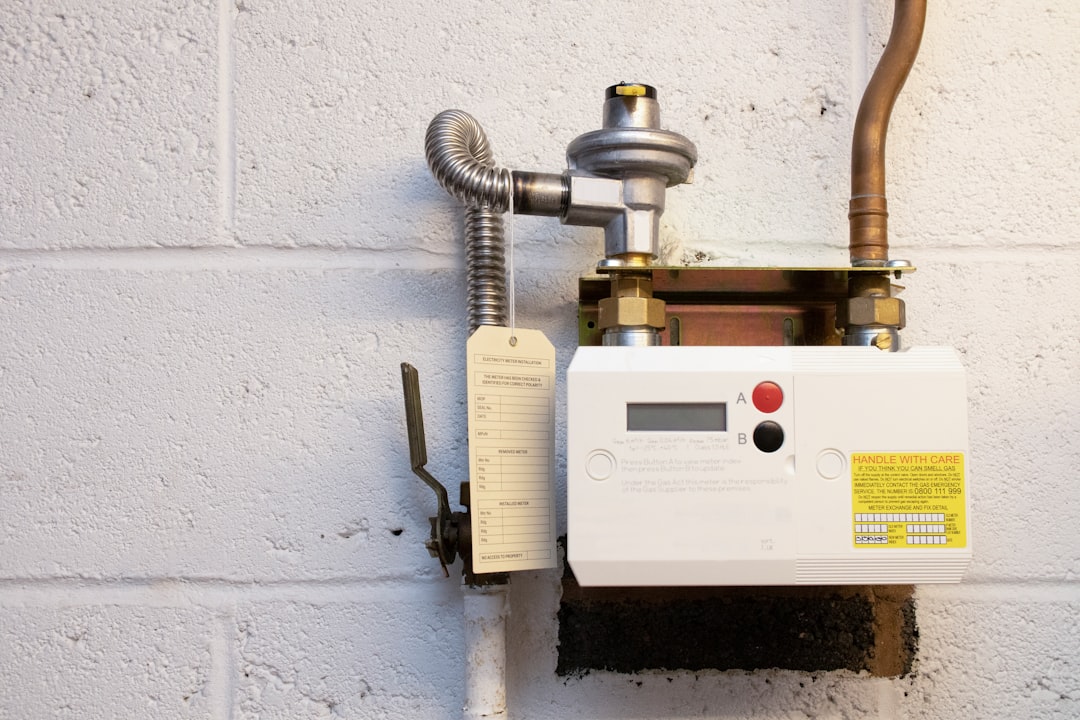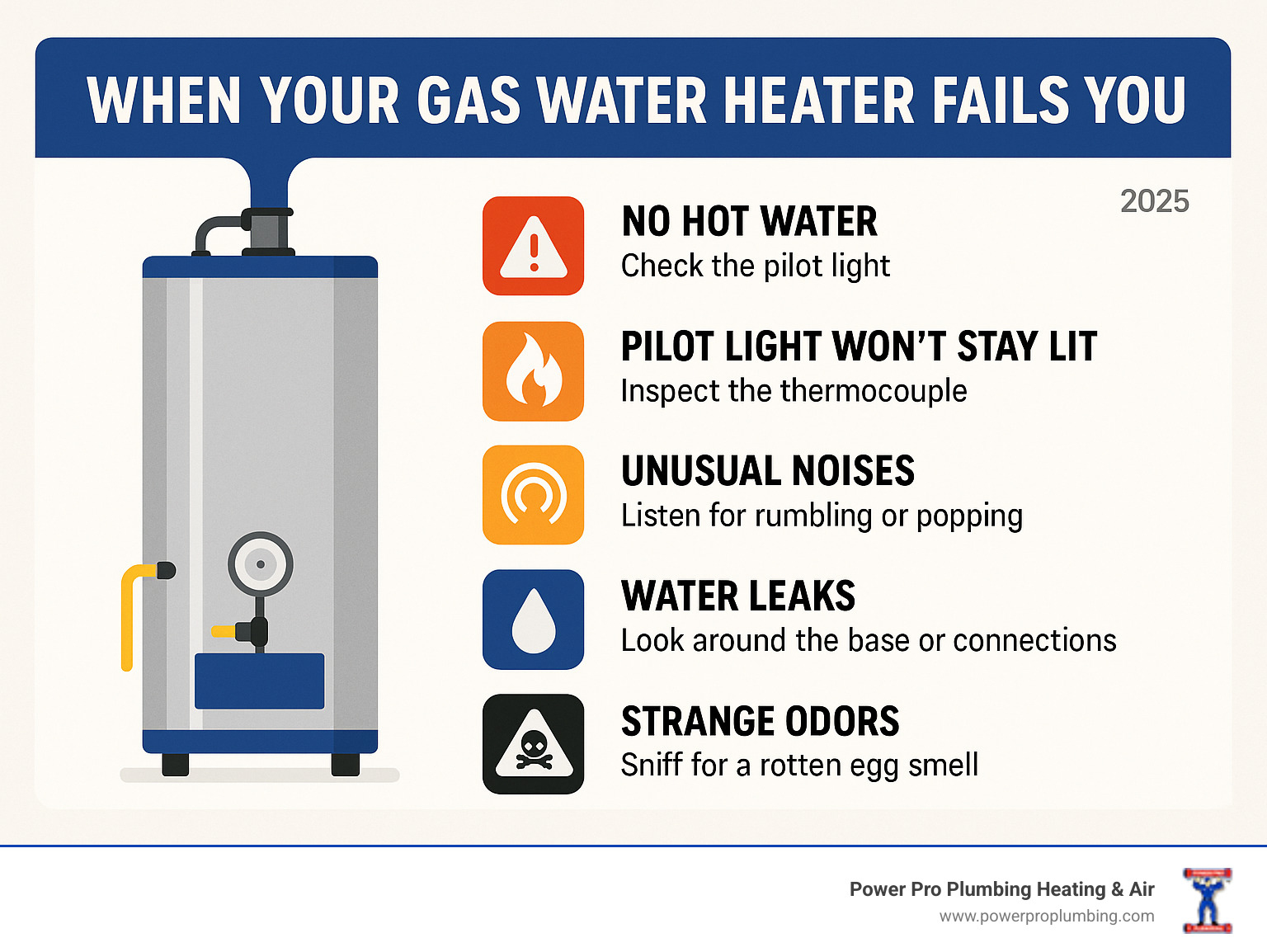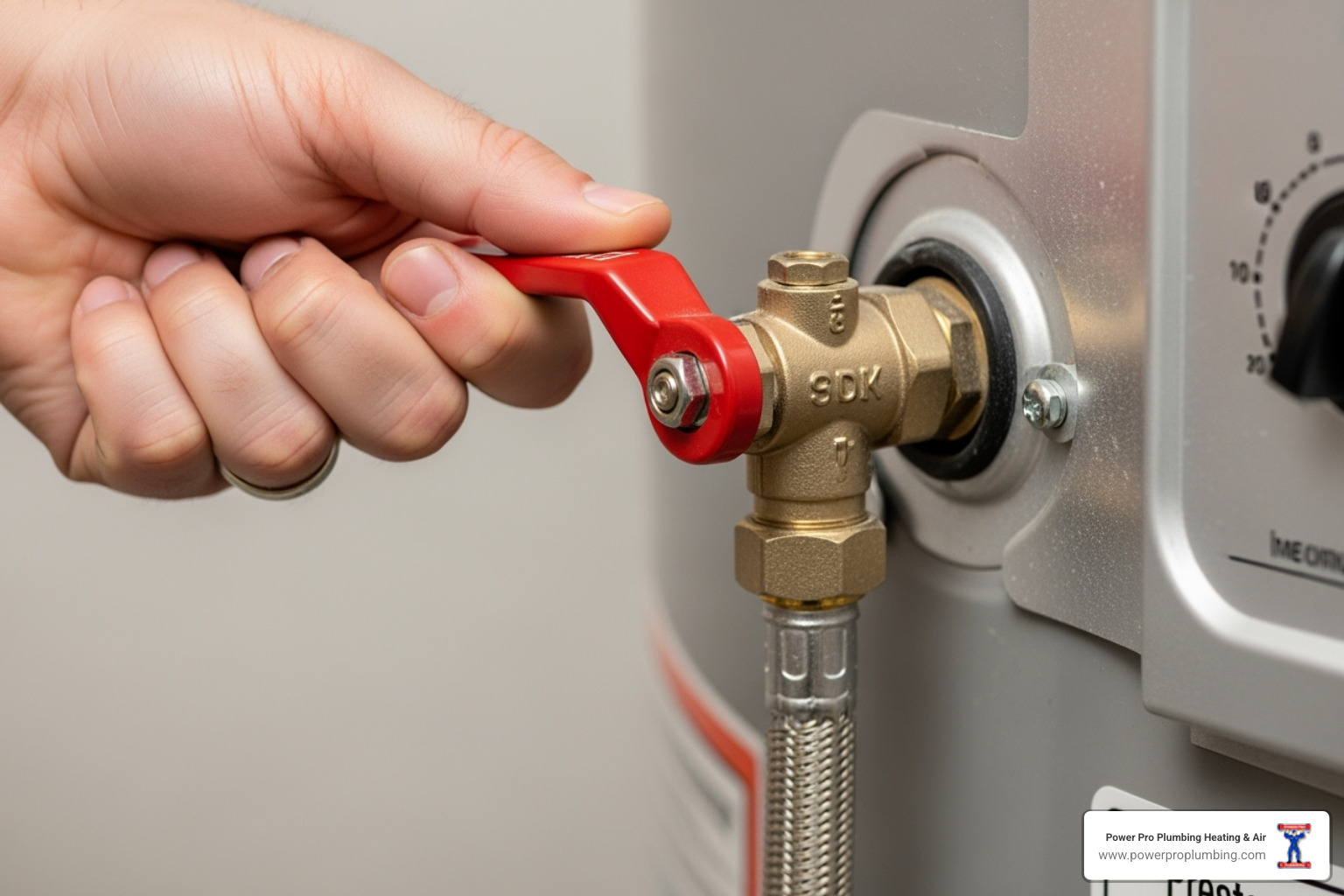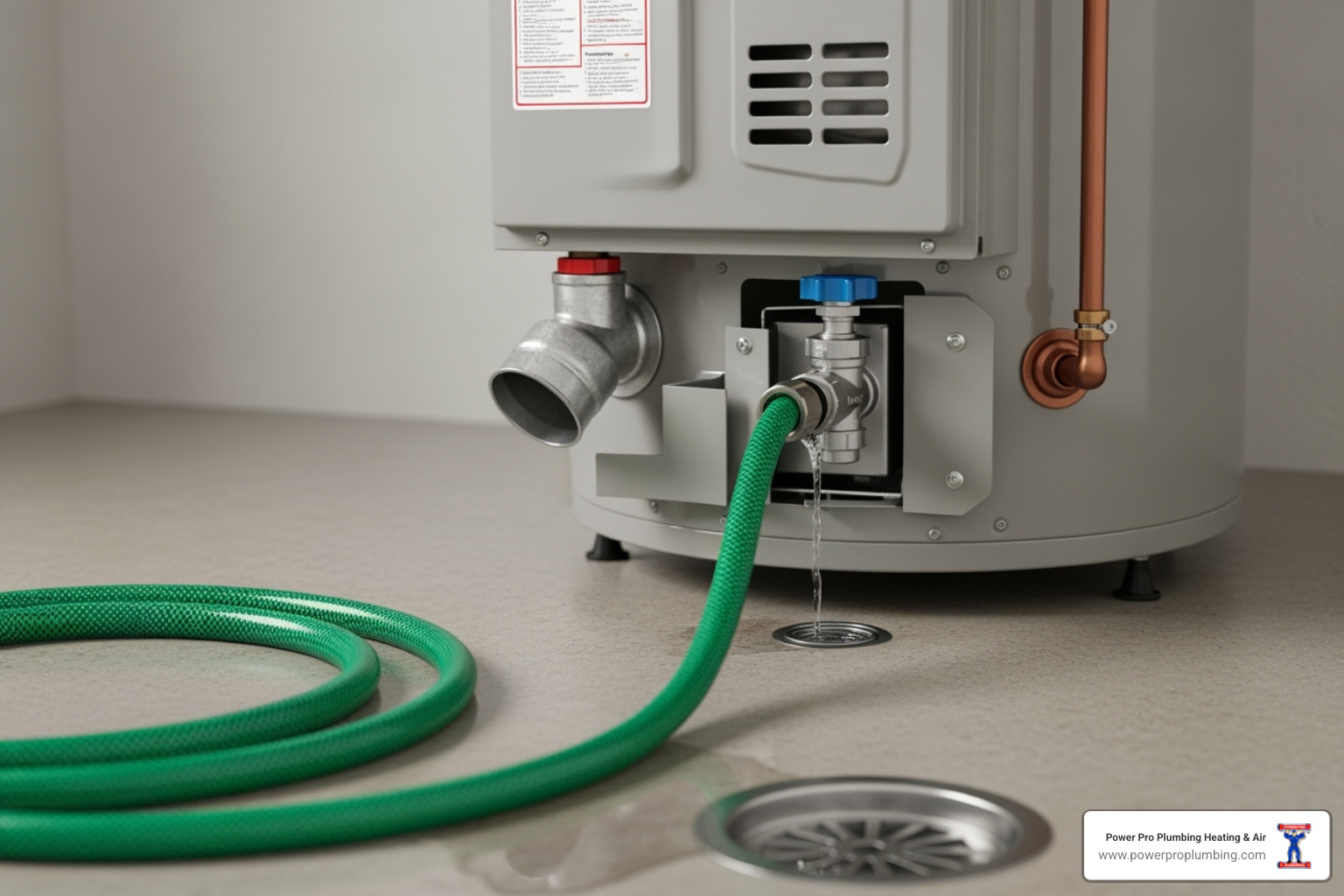
When Your Gas Water Heater Fails You
When your hot water suddenly disappears, it's more than an inconvenience—it's a sign that your gas water heater needs attention. From a pilot light that won't stay lit to strange noises or unpleasant odors, these issues require prompt and safe solutions. Gas water heaters are complex, and while they typically last 10-15 years, understanding common problems can help you know when to call for professional gas hot water heater repairs.
Common Gas Water Heater Issues:
- No Hot Water: Often linked to a pilot light, thermocouple, or gas valve problem.
- Inconsistent Temperature: Usually caused by a faulty thermostat or sediment buildup.
- Strange Smells: A rotten egg odor can indicate a gas leak or bacteria in the tank.
- Unusual Noises: Rumbling or popping sounds suggest sediment buildup or a failing component.
- Water Leaks: Can originate from connections, the relief valve, or a corroded tank.
- Pilot Light Won't Stay Lit: Typically points to a thermocouple, gas valve, or venting issue.
Knowing whether to tackle a repair yourself or call a professional is key to ensuring your family's safety and preventing a small problem from becoming a major expense.

Is Your Water Heater Crying for Help? Recognizing the Signs
Your water heater often gives warning signs before it fails completely. Paying attention to these can save you from a cold shower and a costly emergency.
- Water Leaks: Puddles around the base can indicate a loose connection or a faulty valve. However, if the leak comes from the tank itself, it's a sign of internal corrosion and means a replacement is necessary.
- Discolored or Smelly Water: Rusty or discolored water points to corrosion inside the tank or a failing anode rod. A "rotten egg" smell is usually caused by bacteria in the tank, a problem that can often be solved with professional cleaning or by replacing the anode rod. For more on water quality, see this guide from the University of Georgia Extension.
- Unusual Noises: Rumbling, popping, or whining sounds are typically caused by sediment buildup at the bottom of the tank. This layer of mineral deposits forces the heater to work harder, reducing efficiency and potentially damaging the tank.
- Temperature Problems: If you have inadequate hot water or wild temperature fluctuations, the cause could be a faulty thermostat, a worn-out sensor, or sediment buildup.
Key Components and Safety
Understanding a few key parts can help you diagnose issues. The gas control valve is the brain, regulating gas flow and temperature. The thermocouple is a crucial safety device that shuts off the gas if the pilot light goes out. The burner heats the water, and the anode rod protects the tank from rust.
Proper ventilation is non-negotiable for gas water heaters. They produce carbon monoxide, a dangerous, odorless gas. As noted by health authorities, the water heating process results in the production of carbon monoxide. Ensure the vent pipe is clear and there's good airflow. Signs of poor ventilation, like soot or a yellow flame, require immediate professional attention. Installing CO detectors is a critical safety measure.
Safety First: Before You Touch That Wrench
When it comes to gas hot water heater repairs, safety is everything. Working with gas appliances can be dangerous, potentially leading to gas leaks, fires, or carbon monoxide poisoning. Always prioritize safety before attempting any repair.

Gas Leak Detection: Natural gas has a distinct "rotten egg" smell due to an additive called mercaptan. If you smell this, do not use any electronics or create sparks. Evacuate your home immediately and call your gas company from a safe location. For routine checks, you can apply soapy water to connections; bubbling indicates a leak.
Before any repair, wear protective gloves and safety glasses. Also, turn off any electrical power to the unit, as some components are electric.
How to Safely Shut Off Your Gas Water Heater
Knowing how to shut off your water heater is essential for safety and maintenance.
- Turn Off the Gas: Locate the gas valve on the supply line to your heater. Turn the lever so it's perpendicular to the pipe, or turn the knob to the "OFF" position.
- Shut Off the Water: Find the cold water inlet valve, usually on top of the tank. Turn it clockwise to close it.
- Drain the Tank (If Necessary): For many repairs, you'll need to drain the tank. Attach a garden hose to the drain valve at the bottom and run it to a safe drainage area. Open the drain valve and a hot water faucet in your home to allow air in, which helps the tank drain faster. Be cautious, as the water will be hot.
Always ensure the gas and water are off, you're wearing protective gear, and the area is well-ventilated before starting any work.
Troubleshooting Common Gas Hot Water Heater Problems
When your gas water heater acts up, it's often one of a few common issues. Understanding these can help you identify the problem and decide on the next steps for your gas hot water heater repairs.

Issue 1: The Pilot Light Keeps Going Out
A pilot light that won't stay lit is a frequent complaint. The usual suspects include:
- A faulty thermocouple: This safety device shuts off the gas if it can't sense the pilot flame. If it's dirty or broken, it needs cleaning or replacement.
- A clogged pilot orifice: Debris can block the small opening for the pilot flame, making it too weak to stay lit.
- Drafts: Strong air currents can simply blow the pilot light out.
- A failing gas control valve: If the valve isn't supplying enough gas, the pilot won't stay lit. This requires a professional.
Issue 2: Water Temperature Troubles
- Water is Too Hot: Often, the thermostat is just set too high. For safety and efficiency, it should be set at or below 120°F, as recommended by the Consumer Product Safety Commission. A faulty thermostat or gas valve can also cause overheating.
- Lukewarm or No Hot Water: This is frequently caused by sediment buildup insulating the bottom of the tank, preventing proper heating. Other causes include a faulty gas valve, a tripped high-limit switch, or a water heater that's too small for your household's needs.
Issue 3: Leaks and Drips
Water pooling around your heater is a clear sign of trouble.
- T&P Relief Valve: If this valve is leaking, it's releasing excess pressure or temperature. This is a serious safety concern that requires immediate professional attention.
- Drain Valve or Connections: Leaks from the drain valve at the bottom or the water line connections at the top can often be fixed by tightening or replacing the fittings.
- Tank Corrosion: If the tank itself is leaking, it's a sign of internal corrosion and cannot be repaired. The water heater must be replaced.
While some issues have simple fixes, problems involving gas components or internal tank leaks are best left to the experts.
DIY vs. Professional: When to Call for Gas Hot Water Heater Repairs
While it's tempting to tackle repairs yourself, safety is paramount with gas appliances. Knowing when to call a professional for gas hot water heater repairs is crucial.
DIY-Friendly Tasks:
- Relighting the pilot light (follow manufacturer instructions).
- Adjusting the thermostat.
- Checking for loose water line connections.
When to Call a Professional:
- If you smell gas: Evacuate immediately and call your gas company. This is an emergency.
- Pilot light won't stay lit: This often indicates a faulty thermocouple, gas valve, or ventilation issue that requires an expert.
- Leaks from the tank or T&P valve: A leaking tank means it's time for a replacement, and a leaking T&P valve signals a serious pressure problem.
- Signs of poor ventilation: Soot, a yellow burner flame, or a CO alarm are urgent safety hazards.
- Any repair involving the gas line or internal components: For your safety, leave these complex jobs to a qualified technician.
When to Replace vs. Repair
Sometimes, replacement is more cost-effective than another repair. Consider a new water heater if:
- It's over 10-15 years old: This is the average lifespan for most tank models.
- It needs frequent repairs: Constant service calls add up and indicate the unit is failing.
- The tank is leaking: A corroded tank cannot be repaired.
- You want better energy efficiency: Modern units can significantly lower your utility bills. Upgrading to a tankless model offers endless hot water and even greater efficiency.
Essential Maintenance to Prevent Future Gas Hot Water Heater Repairs
Preventive care is the best way to extend your water heater's life and avoid unexpected breakdowns.

- Flush the Tank Annually: This removes sediment buildup that causes inefficiency and damage.
- Check the Anode Rod: Have a professional inspect the anode rod every few years. Replacing it can prevent tank corrosion.
- Test the T&P Valve: Annually lift the valve's lever to ensure it's working. If it doesn't release water or won't close, it needs to be replaced.
- Schedule Professional Inspections: An annual check-up can catch small problems before they become major, expensive ones.
When Your Gas Water Heater Fails You
When your hot water suddenly disappears, it's more than an inconvenience—it's a sign that your gas water heater needs attention. From a pilot light that won't stay lit to strange noises or unpleasant odors, these issues require prompt and safe solutions. Gas water heaters are complex, and while they typically last 10-15 years, understanding common problems can help you know when to call for professional gas hot water heater repairs.
Common Gas Water Heater Issues:
- No Hot Water: Often linked to a pilot light, thermocouple, or gas valve problem.
- Inconsistent Temperature: Usually caused by a faulty thermostat or sediment buildup.
- Strange Smells: A rotten egg odor can indicate a gas leak or bacteria in the tank.
- Unusual Noises: Rumbling or popping sounds suggest sediment buildup or a failing component.
- Water Leaks: Can originate from connections, the relief valve, or a corroded tank.
- Pilot Light Won't Stay Lit: Typically points to a thermocouple, gas valve, or venting issue.
Knowing whether to tackle a repair yourself or call a professional is key to ensuring your family's safety and preventing a small problem from becoming a major expense.
Is Your Water Heater Crying for Help? Recognizing the Signs
Your water heater often gives warning signs before it fails completely. Paying attention to these can save you from a cold shower and a costly emergency.
- Water Leaks: Puddles around the base can indicate a loose connection or a faulty valve. However, if the leak comes from the tank itself, it's a sign of internal corrosion and means a replacement is necessary.
- Discolored or Smelly Water: Rusty or discolored water points to corrosion inside the tank or a failing anode rod. A "rotten egg" smell is usually caused by bacteria in the tank, a problem that can often be solved with professional cleaning or by replacing the anode rod. For more on water quality, see this guide from the University of Georgia Extension.
- Unusual Noises: Rumbling, popping, or whining sounds are typically caused by sediment buildup at the bottom of the tank. This layer of mineral deposits forces the heater to work harder, reducing efficiency and potentially damaging the tank.
- Temperature Problems: If you have inadequate hot water or wild temperature fluctuations, the cause could be a faulty thermostat, a worn-out sensor, or sediment buildup.
Understanding Your Water Heater's Key Parts
Understanding a few key parts can help you diagnose issues. The gas control valve is the brain, regulating gas flow and temperature. The thermocouple is a crucial safety device that shuts off the gas if the pilot light goes out. The burner heats the water, and the anode rod protects the tank from rust.
The Critical Role of Ventilation
Proper ventilation is non-negotiable for gas water heaters. They produce carbon monoxide, a dangerous, odorless gas. As noted by health authorities, the water heating process results in the production of carbon monoxide. Ensure the vent pipe is clear and there's good airflow. Signs of poor ventilation, like soot or a yellow flame, require immediate professional attention. Installing CO detectors is a critical safety measure.
Safety First: Before You Touch That Wrench
When it comes to gas hot water heater repairs, safety is everything. Working with gas appliances can be dangerous, potentially leading to gas leaks, fires, or carbon monoxide poisoning. Always prioritize safety before attempting any repair.

Gas Leak Detection: Natural gas has a distinct "rotten egg" smell due to an additive called mercaptan. If you smell this, do not use any electronics or create sparks. Evacuate your home immediately and call your gas company from a safe location. For routine checks, you can apply soapy water to connections; bubbling indicates a leak.
Before any repair, wear protective gloves and safety glasses. Also, turn off any electrical power to the unit, as some components are electric.
How to Safely Shut Off Your Gas Water Heater
Knowing how to shut off your water heater is essential for safety and maintenance.
- Turn Off the Gas: Locate the gas valve on the supply line to your heater. Turn the lever so it's perpendicular to the pipe, or turn the knob to the "OFF" position.
- Shut Off the Water: Find the cold water inlet valve, usually on top of the tank. Turn it clockwise to close it.
- Drain the Tank (If Necessary): For many repairs, you'll need to drain the tank. Attach a garden hose to the drain valve at the bottom and run it to a safe drainage area. Open the drain valve and a hot water faucet in your home to allow air in, which helps the tank drain faster. Be cautious, as the water will be hot.
Always ensure the gas and water are off, you're wearing protective gear, and the area is well-ventilated before starting any work.
Troubleshooting Common Gas Hot Water Heater Problems
When your gas water heater acts up, it's often one of a few common issues. Understanding these can help you identify the problem and decide on the next steps for your gas hot water heater repairs.

Issue 1: The Pilot Light Keeps Going Out
A pilot light that won't stay lit is a frequent complaint. The usual suspects include:
- A faulty thermocouple: This safety device shuts off the gas if it can't sense the pilot flame. If it's dirty or broken, it needs cleaning or replacement.
- A clogged pilot orifice: Debris can block the small opening for the pilot flame, making it too weak to stay lit.
- Drafts: Strong air currents can simply blow the pilot light out.
- A failing gas control valve: If the valve isn't supplying enough gas, the pilot won't stay lit. This requires a professional.
Issue 2: Water Temperature Troubles
- Water is Too Hot: Often, the thermostat is just set too high. For safety and efficiency, it should be set at or below 120°F, as recommended by the Consumer Product Safety Commission. A faulty thermostat or gas valve can also cause overheating.
- Inadequate or Lukewarm Hot Water: This is frequently caused by sediment buildup insulating the bottom of the tank, preventing proper heating. Other causes include a faulty gas valve, a tripped high-limit switch, or a water heater that's too small for your household's needs.
Issue 3: Leaks and Drips
Water pooling around your heater is a clear sign of trouble.
- T&P Relief Valve: If this valve is leaking, it's releasing excess pressure or temperature. This is a serious safety concern that requires immediate professional attention.
- Drain Valve or Connections: Leaks from the drain valve at the bottom or the water line connections at the top can often be fixed by tightening or replacing the fittings.
- Tank Corrosion: If the tank itself is leaking, it's a sign of internal corrosion and cannot be repaired. The water heater must be replaced.
While some issues have simple fixes, problems involving gas components or internal tank leaks are best left to the experts.
DIY vs. Professional: When to Call for Gas Hot Water Heater Repairs
While it's tempting to tackle repairs yourself, safety is paramount with gas appliances. Knowing when to call a professional for gas hot water heater repairs is crucial.
DIY-Friendly Tasks:
- Relighting the pilot light (follow manufacturer instructions).
- Adjusting the thermostat.
- Checking for loose water line connections.
When to Call a Professional:
- If you smell gas: Evacuate immediately and call your gas company. This is an emergency.
- Pilot light won't stay lit: This often indicates a faulty thermocouple, gas valve, or ventilation issue that requires an expert.
- Leaks from the tank or T&P valve: A leaking tank means it's time for a replacement, and a leaking T&P valve signals a serious pressure problem.
- Signs of poor ventilation: Soot, a yellow burner flame, or a CO alarm are urgent safety hazards.
- Any repair involving the gas line or internal components: For your safety, leave these complex jobs to a qualified technician.
When to Consider Replacement Over Repair
Sometimes, replacement is more cost-effective than another repair. Consider a new water heater if:
- It's over 10-15 years old: This is the average lifespan for most tank models.
- It needs frequent repairs: Constant service calls add up and indicate the unit is failing.
- The tank is leaking: A corroded tank cannot be repaired.
- You want better energy efficiency: Modern units can significantly lower your utility bills. Upgrading to a tankless model offers endless hot water and even greater efficiency.
Essential Maintenance to Prevent Future Gas Hot Water Heater Repairs
Preventive care is the best way to extend your water heater's life and avoid unexpected breakdowns. A little TLC today can save you from cold showers and emergency repair calls tomorrow.
Essential Maintenance to Prevent Future Gas Hot Water Heater Repairs
Prevention is always better (and often cheaper!) than cure, especially for your gas water heater. Regular maintenance can significantly extend its lifespan, improve its efficiency, and help you avoid unexpected breakdowns and costly gas hot water heater repairs.

Flushing the tank at least once a year is the most important task you can perform. Over time, minerals and sediment settle at the bottom, creating a layer that insulates the water from the burner. This forces your heater to work harder, reduces efficiency, and can lead to overheating and premature failure. Flushing the tank removes this sediment, keeping your unit running smoothly.
Another key maintenance task is checking the anode rod. This metal rod sacrifices itself by attracting corrosive elements, protecting the steel tank. We recommend having it inspected every few years and replaced when it's significantly worn, which can add years to your water heater's life.
Finally, test the T&P valve annually. This safety valve releases water if the temperature or pressure inside the tank gets too high. Simply lift the lever for a few seconds to ensure water flows out, then let it snap back. If it doesn't work correctly, it needs immediate professional attention.
An annual professional inspection is also a wise investment. A trained technician can spot potential issues, check for gas leaks, ensure proper ventilation, and perform maintenance you might miss, saving you from bigger headaches down the road.
Conclusion
Understanding your gas water heater, from its warning signs to basic maintenance, can save you from the headache of unexpected breakdowns. While simple tasks like adjusting the thermostat are manageable, gas hot water heater repairs often require professional expertise for safety and accuracy. Issues involving gas leaks, faulty valves, persistent pilot light problems, or tank corrosion should always be handled by a qualified technician.
Regular maintenance, such as annual tank flushing and T&P valve testing, is the best way to ensure a long, efficient life for your unit and prevent costly emergencies.
When you need expert gas hot water heater repairs in Orange County and the greater Los Angeles area, Power Pro Plumbing Heating & Air is here to help. Our experienced technicians understand the complexities of gas water heater systems and prioritize your safety above all else. With over 28,573 satisfied customers backing our reputation, we're equipped to handle everything from simple maintenance to complex repairs and full system replacements.
Don't let water heater troubles leave you out in the cold. For comprehensive water heater services and reliable gas hot water heater repairs, visit us at https://www.powerproplumbing.com/water-heaters/water-heater-services-orange-ca/ or give us a call. We've got your gas repairs covered!

